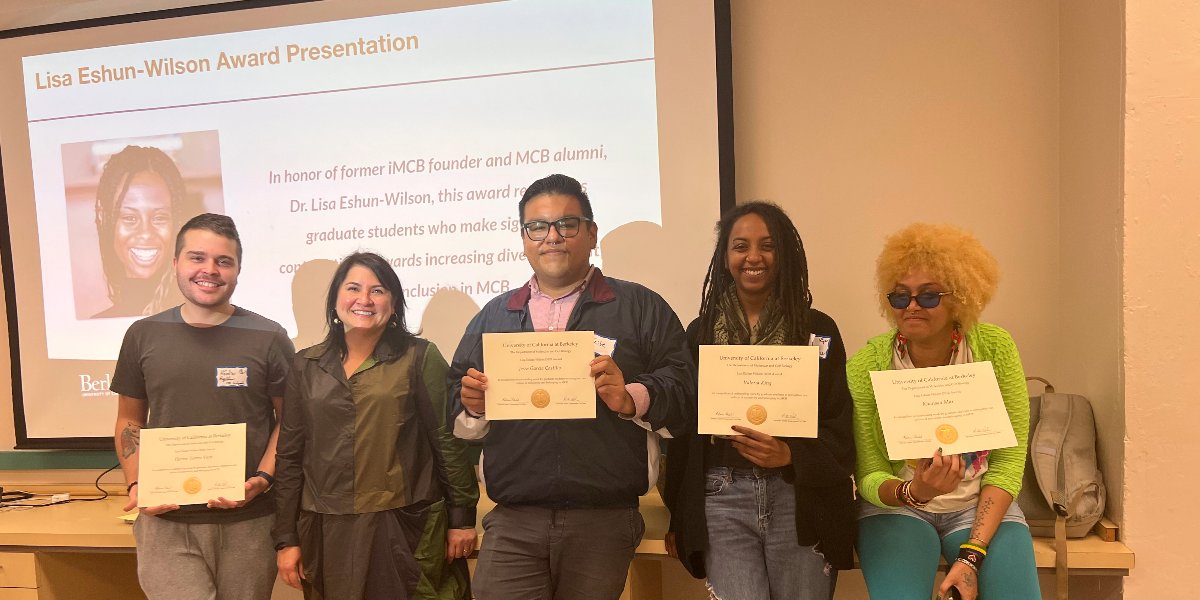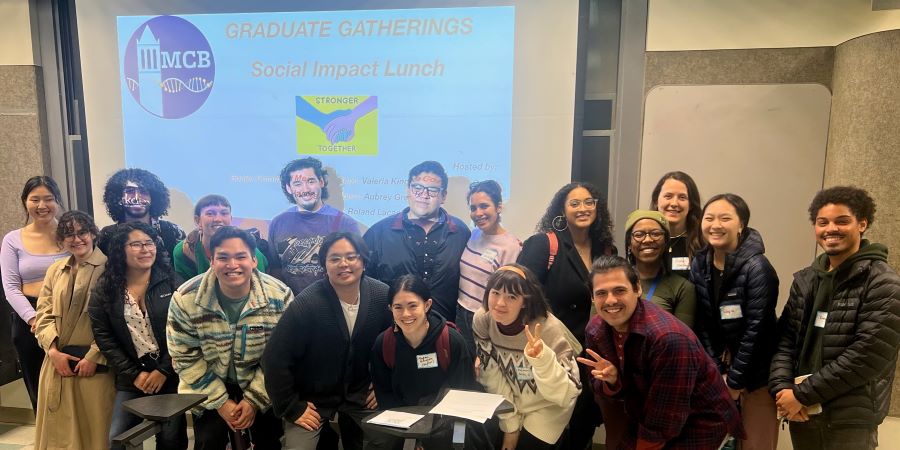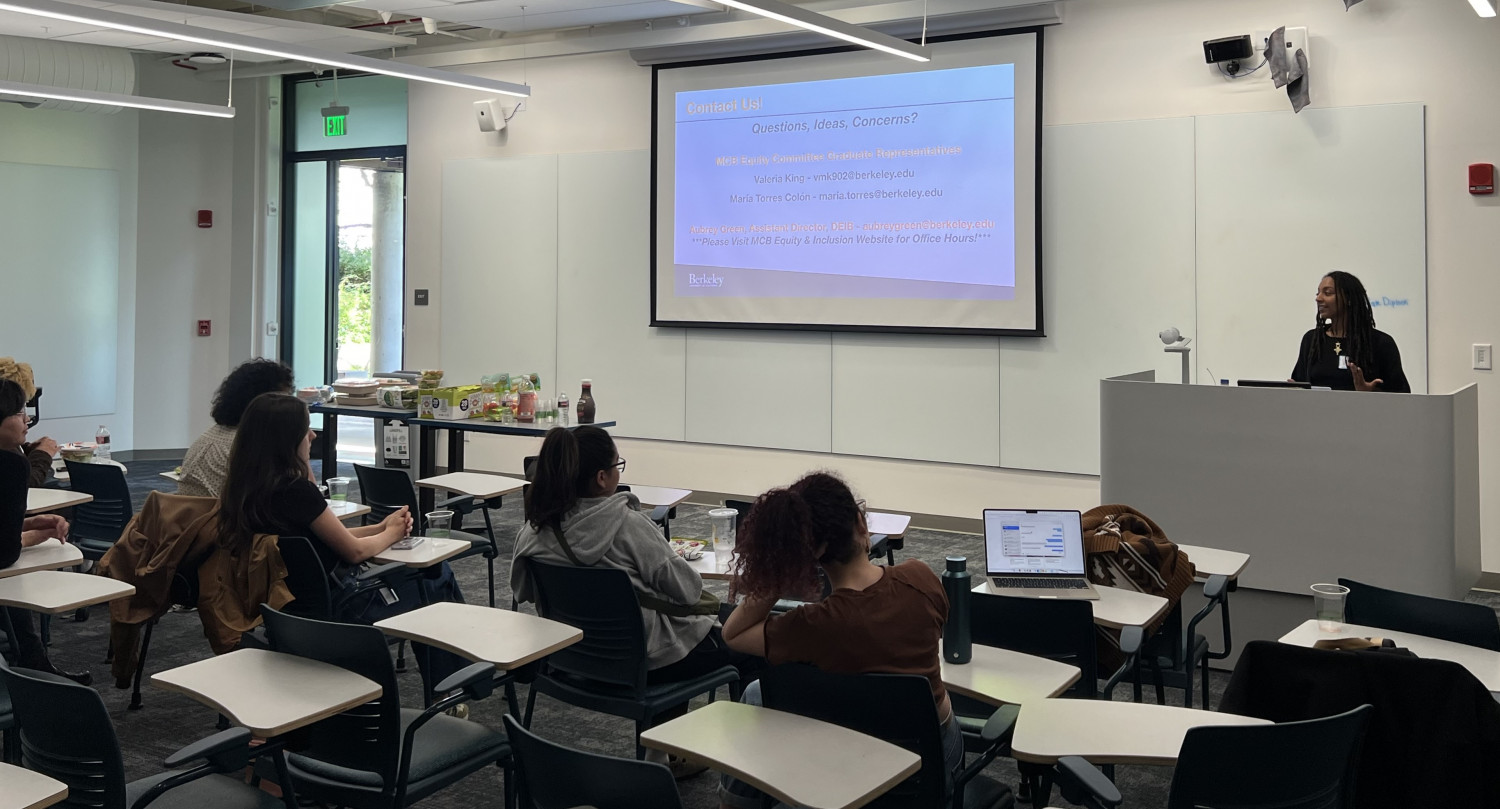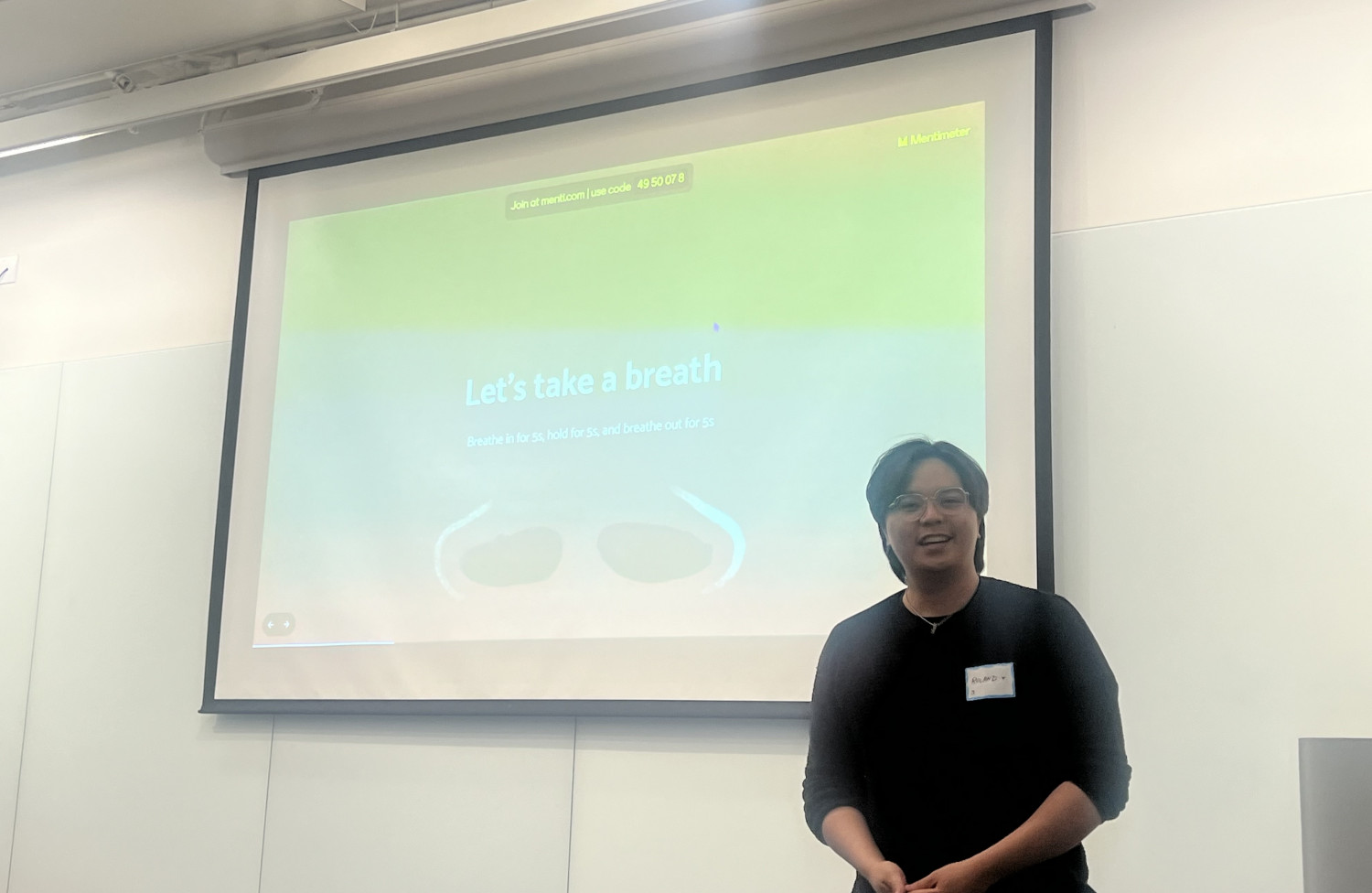
Grad Gatherings initiative provides space for community and care
By Héctor L. Torres Vera
Playing cards. Food. Rock climbing. Painting. Fortnite. Cooking. Snowboarding. Curling. Sculpting. Hiking. Dancing. Biking. Food. Houseplants. Swimming. Camping. Concerts. Food…
Besides bringing joy to many graduate students, these activities are also incredibly important for their success. Specifically, they allow the cultivation of communities with shared interests.
As reports of high anxiety and depression levels continue [1,2,3], keeping a healthy sense of community and belonging is crucial for students’ health and well-being. [4,5]
Student representatives in the MCB Equity Committee, María Torres Colón and Valeria King, had this at the forefront of their minds when they started the MCB Grad Gatherings initiative, a series of events throughout the academic year intended to create spaces for graduate students to build community and foster diversity, equity, inclusion, and belonging (DEIB).

The First Grad Gathering and the Lisa Eshun-Wilson Community Award
Creating spaces for students to come together is a long-standing tradition for MCB students. The iBio initiative is a clear example of that. It has become a cornerstone of the department’s diversity, equity, inclusion, and belonging initiatives (DEIB). It is a hallmark of the orientation process for first-year students, touching on themes such as ableism and racism in academia. Still, a recurring theme arose in the feedback received from the past two annual conferences: a need for additional spaces to promote DEIB throughout the academic year.
Torres-Colón and King saw this need and created Grad Gatherings with the help of fellow PhD student Roland Lacap and MCB’s Assistant Director of Diversity, Equity, Inclusion & Belonging and Graduate Program Coordinator Irlanda Gonzalez. Their goal? Cultivating community-building events by identifying graduate students' diverse needs and creating sustainable programming throughout the academic year that brings students together.
“Spaces where we can discuss DEIB are few and far between,” commented Torres Colón. She and the team organized the first Graduate Gathering this past Fall semester, where they arranged a lunch reception and table discussions among attendees. She adds, “It also served as a feedback session to get information about what students, particularly those from historically excluded backgrounds, would like to see in the future.”
This first Grad Gathering also debuted the annual Lisa Eshun-Wilson Community Award for Diversity, Equity, Inclusion, Belonging, and Justice, which recognizes the outstanding contributions of current MCB graduate students and postdocs who have demonstrated exemplary commitment to initiatives, efforts, or activities that advance DEIBJ within our community. This award echoes the Cris Alvaro Memorial Prize, an award given during commencement that was created in 2019, honoring the life and legacy of trans and non-binary MCB graduate student Cris Alvaro. “Recognition systems like the Cris Alvaro Prize and the Lisa-Eshun Wilson Award highlight students that deserve recognition— it means the Department sees you and values what you bring to the community,” comments Torres Colón.
Bringing students together for a Social Impact Learning Lunch

Following the feedback they gathered, Torres Colón and King developed the second Grad Gathering, which was on February 28, 2024. Titled “Learning Lunch: Social Impact in Science,” the event brought over 35 graduate students and postdocs from MCB and other departments to the lobby of Weill hall. After feasting on mac & cheese and light conversation, students gathered in a classroom and gave short presentations about a variety of DEIB initiatives they take part of.
Amongst those present was Anastasiya “Anna” Trzcinski, a second year PhD student in the Collins group. Her and fellow graduate student Meghan Pressimone shared their work with Expanding Your Horizons, a conference that introduces middle school girls, as well as trans, and gender non-conforming and/or non-binary students, to careers in STEM. Trzcinski explains, “We recruit graduate students and postdocs to serve as workshop leaders—in one workshop, they were extracting DNA from strawberries.” These approachable and fun activities, along with a keynote speaker, have inspired the diverse scientists of tomorrow for over 50 years.
An organization of similar age and mission is SACNAS, the Society for the Advancement of Chicanos/Hispanics and Native Americans in Science. Representing Berkeley’s SACNAS Graduate Student chapter was Dominik A. Aylard, a fourth year PhD candidate in the Robey group. Their work aims to establish community amongst graduate students of marginalized identities, and ensure all students have a healthy support network. “Working with SACNAS lets me turn my experiences in graduate school into resources I can offer to help the next generations of graduate students,” Aylard shares. He presented events such as fellowship and qualifying exam workshops, as well as community outreach events, all geared towards making graduate students feel supported throughout their degree. “We want to make sure everyone in our program (MCB) and in other STEM programs are comfortable and have a community of other graduate students to confide in,” Aylark adds. This sentiment was shared with many others, and was consistent across the gathering’s attendees.
One first year graduate student, Ted Daniel Llera, shares their appreciation for the space, “People from all different backgrounds were there, and it showed a community I felt I belonged to.” Ted explained that often in graduate school, “we’re isolated in our own niches,” and that the Grad Gatherings “brought a spark of motivation and hope that we can all do this together.”
This bringing together of people was one of the main goals of this event, particularly within different research groups, departments, and organizations. Trzcinski explains, “People I don’t get to see often were presenting about the impactful things that they're doing for the community. I feel like we don't talk about that enough. We might talk about it with our friends, but it's nice to have a structured platform to talk about these initiatives.” She also states that these gatherings are crucial for recruiting other graduate students, “...our work is often so reliant on getting volunteers from the community—it’s great to talk about it and plant the seed in people's minds for next year.”
In addition to SACNAS and Expanding Your Horizons, other initiatives presented were the UC Historically Black Colleges and Universities (UC-HBCU) Initiative, the Integrative Biology Summer Undergraduate Research Experience (SURE), and the Neuroscience Research Experience Pathways (REP) program.
More spaces for community building and wellness on their way

On April 27, the Grad Gatherings celebrated their final event of the semester, “Wellness Connections: Engaging Minds, Building Community”. In the intimacy of Barker 101, students gathered and discussed their experiences with mental health, work-life balance, and how to best take care of themselves throughout their degree.
Students found inspiration in these gatherings. Trzcinski points out the broader impact of such events, “When it comes to commitment to DEIB, simply having spaces like this—just for people to come together and feel supported by each other—is important. I felt very inspired.” Her words resonate with many graduate students who often find themselves isolated in their academic lives. Grad Gatherings and similar initiatives offer a chance to break free from these silos and connect with others who share common goals and interests. “I think it’s important we continue events like these if we want people to be happy," she remarks.

Events such as these create a sense of belonging and provide a platform for graduate students to support each other in meaningful ways. As the academic year comes to an end, Torres-Colón, Kind, and their team are already planning future gatherings to keep the momentum going. Their vision is to create a network that reaches beyond departmental boundaries, connecting students from various disciplines and backgrounds.
The success of Grad Gatherings is a reminder that fostering community and inclusion is a continual process. Department programming such as these gatherings, can play a crucial role in supporting the well-being of graduate students. By creating a safe space for discussions on diversity, equity, and inclusion, these events help to address systemic issues while promoting a culture of empathy and respect.
The upcoming iBio conference in August 2024 promises to be another significant step in this direction. It will serve as a platform for students, faculty, and staff to share their experiences, learn from each other, and continue building a supportive community.
How to get involved
Graduate students interested in making a positive impact are encouraged to get involved with Grad Gatherings, SACNAS, Expanding Your Horizons, and other community-driven initiatives. These events provide opportunities to network, collaborate, and contribute to a more inclusive academic environment.
Whether it's presenting at a Learning Lunch, volunteering for a community outreach program, or simply attending a gathering, every effort counts. By joining these initiatives, graduate students can help shape a more inclusive and supportive academic community, ensuring that future generations of scholars have the resources and networks they need to succeed.
For more information on upcoming events and how to get involved, students can contact the MCB Equity Committee and Aubrey Green, or visit the MCB Equity Committee’s website.
Let's continue to work together to create a community where everyone feels valued, respected, and empowered to make a difference.
Back to Main Spring 2024 Newsletter Page
| Connect With Us! | ||||
 MCB X |
 LinkedIn Postdocs, PhDs, or Undergrads |
 Cal Alumni Network |
 Give to MCB |
|
